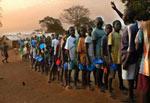Over a million children at risk if Ugandan peace talks collapse

The future of Uganda's children is under severe threat as negotiations between the government of Uganda and the Lords Resistance Army edge closer to collapse. Statement by Save the Children
If talks fail, children, particularly in the north of the country, will once again live in fear of the physical, emotional and sexual violence that dominated the 20-year conflict.
Children are still the principle victims of violence in the Ugandan battle. An estimated 1,500 children are still in LRA ranks, and at least 10,000 children remain unaccounted for. During the fighting, some 20,000 to 25,000 were abducted, made to work as sex slaves, child soldiers, porters of weaponry and often forced to mutilate or kill friends and relatives. Tens of thousands of others became 'night commuters', walking long distances every night into towns to try to avoid brutal attack.
Until now, the August 2006 signing of the Cessation of Hostilities Agreement has led to increased safety, confidence and hope for children. Children have had space to start coping with the horrors so many experienced. With assistance from NGOs such as Save the Children, schools are being rebuilt and there is better access to healthcare. The improved security has allowed NGOs much better access to camps for families forced from their homes by fighting. Displaced people have been able to move to new settlement sites, often closer to their homes and with access to farmland. New fighting and a return to terror tactics in northern Uganda could destroy all this progress.
There is fear that the emergency situation in northern Uganda is worsening by the day. Insecurity is already rife in parts of Pader district, and this could quickly spread to other areas. Violence has already broken out in several recent attacks in the Juba area of southern Sudan, while the LRA and government forces continue to trade public accusations of attacks and counter-attacks, further poisoning the atmosphere.
Any hope of reconciliation is fading fast and needs international support now. Save the Children is urgently calling on all international parties to strongly press the LRA and Ugandan government to adhere to the Cessation of Hostilities Agreement and negotiate a final and binding settlement to the conflict.
Valter Tinderholt, Programme Director for Save the Children in Uganda, said "The UN, African Union, neighbouring states and the wider international community – including Britain, who this tax year will have given £70m of aid to Uganda – must speak with a united voice to push for the resumption of talks. Children can't wait for peace to be established. Both the LRA and Ugandan government face challenges, but these can be overcome with external assistance and pressure. "
Save the Children calls on the diplomatic community in Kampala to stress that any withdrawal from the peace talks is an unacceptable path. It also appeals to the Ugandan government to ensure access to education in order to rewrite the future for all children in northern Uganda. The charity is encouraged by the appointment of the UN Special Envoy to the LRA affected areas, and call on the Envoy to liaise with both sides to reach a negotiated settlement.
Save the Children recommends that:
- The UN, African Union, neighbouring states and the wider international community speak out with a united voice for the resumption of productive peace talks
- The Government of Uganda and LRA immediately focus on peaceful resolution of the conflict and respect the Cessation of the Hostilities Agreement.
- Both sides immediately cease all military activity, as stipulated in the Cessation of the Hostilities Agreement, in order not to undermine the peace talks and build confidence between the parties and with the communities affected.
- The LRA order all fighters to assemble and immediately release all women and children.
The diplomatic community in Uganda jointly express stronger support for the peace talks and provide technical assistance to the teams to improve negotiating skills.
More: www.savethechildren.org.uk
